FÖN
Alone on the mountain
 What
has he not tried to escape the bourgeois idyll of Bad Goisern in the
beautiful Salzkammergut. The emigrant (twice!) and globetrotter Hubert
Achleitner had to first be instructed in the art of the nose flute by
natives in the Philippines in order to discover his affection for Austrian
folk music. Defiantly he took the name of his birth town and made Styrian
accordion and a strong pinch of rock and soul native yodel get a move
on, and took his Alpinkatzen to Austin, Texas.
Then in 1995 he simply had no more desire for stress, retired and travelled
again. To the Dalai Lama and Tibet, from where he brought back Inexil,
to the legendary primate research scientist Jane Goodall, to Kenya, where
he got his inspiration for Gombe. Both unusual
world music, both 1998. And last spring he suddenly returned: first Fön,
a kind of acid-jazz-remix of the old Alpinkatzen,
and then Trad, a rough ceremonial lesson
in Austrian folklore.
What
has he not tried to escape the bourgeois idyll of Bad Goisern in the
beautiful Salzkammergut. The emigrant (twice!) and globetrotter Hubert
Achleitner had to first be instructed in the art of the nose flute by
natives in the Philippines in order to discover his affection for Austrian
folk music. Defiantly he took the name of his birth town and made Styrian
accordion and a strong pinch of rock and soul native yodel get a move
on, and took his Alpinkatzen to Austin, Texas.
Then in 1995 he simply had no more desire for stress, retired and travelled
again. To the Dalai Lama and Tibet, from where he brought back Inexil,
to the legendary primate research scientist Jane Goodall, to Kenya, where
he got his inspiration for Gombe. Both unusual
world music, both 1998. And last spring he suddenly returned: first Fön,
a kind of acid-jazz-remix of the old Alpinkatzen,
and then Trad, a rough ceremonial lesson
in Austrian folklore.
Now he is coming to Bielefeld. We wanted to telephone him before. And Hubert von Goisern wanted best to be called between 8am and 10am. No problem, because Tips is a listings magazine which has slept well.
One is not offered an interview between 8am and 10am every day...
I am an early-riser, but it is sometimes not so good (laughs)
Why?
I sometimes don't get enough sleep because I cannot sleep after 9am at the latest. That means that if I am up until 4am because I am working, then I only sleep for five hours. And if that goes on for a week, then I get a deficit.
What was for breakfast today?
I always drink a big cup of strong tea with milk and sugar and with it a bread roll with home-made jam.
In the last years, you have almost always released 'double' albums: the live album at the end of the Alpinkatzen, then Inexil and Gombe at the same time and now with a short gap, Fön and Trad. How long do you want to keep seeing through this creative power play?
Phew, I don't know. It's like getting up early, it just happens. And if it doesn't come, then it doesn't. I had a break for a time. Now I have the music for the next three or four albums in my head, and have already begun with the production. I hope that I will have enough time in the winter to finish the next two.
...which will then be released at more or less the same time?
I don't know yet. Fön and Trad could have also been released at the same time. We decided better to separate them by a few months. But as far as I am concerned, if it is ready, I also want it to come out. If it lies somewhere for a year, then I listen to it again before it comes out and I just want to change something again.
I thought that perhaps your record company stepped on the brakes. Or do you have such a standing that everyone does what Hubert von Goisern says?
I just have a good standing and can say to them: "Dare to do something!" The record company then organise it how I like to have it. But nobody really knows how and when something happens. And then they are all really happy if someone gives them handicaps.
As a Northerner here in Ostwestfalen, I found Trad more difficult to approach than Fön. Where is your main focus in your concert?
We play the whole Fön programme and a large part of the Trad programme. We have already played around 60 concerts in the summer with this and we were in Berlin, Dresden, Bremen or Hamburg. And the pieces from Trad went down especially well! It was as quiet as a mouse, you could have heard a pin drop. Naturally live, more dynamic is added and the songs simply get more of a thrust. But my musicians had also suspected that the people would chase the Trad programme away. And then everyone was totally amazed that it had worked. Me too, actually. Because if 1,500 people are standing there and it becomes too thoughtful, you think, can you do that? But it works very well. Thank God.
With the last two albums, you follow the Alpinkatzen time more again. Gombe and Inexil fell out musically. Is that an isolated chapter for you?
There are also roughly fifteen minutes from the Gombe album in the live programme! Of course both albums arose with a completely different requirement from Fön. With Fön I wanted to write music with which I could go on tour. Both Gombe and Inexil - like the film music for Schlafes Bruder by the way - were never planned for the stage. I could work differently there - and that's why I can also very well imagine that I will compose and produce music again that is not suitable for a concert.
You just spoke of Schlafes Bruder. Will there be film music from you again soon?
At the moment, I don't have any capacity free, but perhaps next year or the year after. I would like to play with it again, for the medium of film is very exciting. But I still know too few or not the right people.
But they know you and could come to you...
No, what I have received for offers until now does not interest me. But if it should happen, then it will happen.
If you look around you in the German-speaking music scene, where do you find kindred spirits?
(hesitant) Wolfgang Ambros, André Heller, in the German-speaking area there is also Lindenberg, Nina Hagen or Thomas D (short pause) The fact that no more occur to me now is naturally also a shortcoming for the radio. In Austria or Bavaria, they steadfastly refuse to play something German. There you only always hear this united mush, this musical McDonald's, and you are just pleased if sometimes Eros Ramazzotti emerges. I am also not someone who goes to the record shop once a week and listens to everything that is new. That is why I do not know whether the musical landscape is really as miserable as it seems to me.
Can one also really imagine Hubert von Goisern on the Loveparade?
If I were to be invited to do something there, then all right. But I am not a person who comes to mass events. Such crowds are simply too much for me. I would much rather go up a mountain alone than throw myself into the turmoil.
You have tackled Jörg Haider again and again. But after the excitement about the government involvement in the Liberals, the subject was not big news any more.
That was always a mock fight. Now we have a situation in Italy with Berlusconi, which is no better than with us here in Austria and no-one gets upset about it. I also hear nothing from - very esteemed by me - Foreign Minister Fischer. If I think about it, how he has committed himself to Austria, why does he not do the same for Italy? The sanctions, as I said from the start, were counterproductive. They have only created a select convergence and EU hostility. A Haider as a head of government of a province down there in Carinthia is basically no worse than a Franz Josef Strauß was in Bavaria. The attitude that Haider represents is not new. It was always latently there, it was just under the lid. It has always stunk. Now everyone can smell it, now one must tackle it. And that also has its silver lining. You can no longer say: Ah, it won't come to anything. Now it is there and that creates a greater political awareness than we had two years ago. Where that leads to, I don't know. But (laughs) we may recover from this bitter pill!
You are not playing for the first time in Bielefeld. Do you associate any memories with the town?
I am fairly sure that Bielefeld was the place where the drummer cut through his thumb's tendon after the concert. When I see the premises again, I will know exactly.
Did you have to break off the tour?
No, we then still had a date the next day and after that a week's break. The thumb had to have stitches, but he could still play with one hand. In the free week, we then rehearsed with a musician what our drummer could not play with the other hand. But this time I am keeping an eye on the drummer!
Hubert von Goisern
For the third time already this year - after March and June - Hubert Achleitner from Bad Goisern stopped off in Augsburg. SiSA editor Christine Tassinger had the opportunity to interview the charismatic 49 year old musician before his concert in the 21st October.
You have already been to Augsburg twice this year, in March and June. Do you have especially loyal fans here?
Yes, there must probably be many and above all, many loyal fans, otherwise I cannot imagine that it works three times in one year.
Your concert is a musical world journey which in the second part returns to your native music and to your homeland. What do these journeys mean to you?
Well, I simply like to travel, through it I distance myself from myself and my traditions and I can see it completely from the outside. Best I like to travel to someplace or other which also does not have to be far away, where I have never been and where I must really be in the here and now with all my senses in order to find my way around. That is what I like most about travelling. It is nothing routine. It is indeed strenuous if there is no routine, when you see what happens with every step you take and you do not know what is around the next corner, but that is really exciting for me. It is a similar feeling when I go on stage. There is no thought about how it was an hour before or how it will be in the morning, but it is simply here and now.
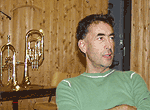 Is
there still room for homeland sentiments? Do you actually still live
in Goisern?
Is
there still room for homeland sentiments? Do you actually still live
in Goisern?
No, I have a house there which I retire to now and then, but my family, my wife and my two children are in Salzburg. I spend most of my time there if I am not on tour.
In the song Katholisch, you make nasty remarks about the preachers who have a girl behind the altar who is making eyes at them. Where do you feel at home religiously? You have also even met the Dalai Lama.
Err, yes I feel probably like many do, that they could no longer feel at home in a religion. Because the picture of God that respective religions have does not suit me. Basically I think the message of the Old Testament is right: you should not make yourself a portrait of God. And the moment when God is worshipped as a father figure, it just doesn't work any more. Sometimes it happens that there is such a denomination which gathers together and where I can go back because that is simply my sort of denomination. But on the other hand, I nevertheless feel embedded and born in what I believe. I believe in God, but I have a problem with the concept that he sounds masculine. But I believe in something which is bigger than me. Something in which I was born, not matter what I do.
You are from Austria and as is known, you love the mountain world. Do you actually ski, or do you play another sport?
I love to ski. It is the one sport that I still do. Still a bit of climbing in the summer, but less and less. Now I go mountain walking more because to go climbing you just need such a good partnership which you constantly maintain and I am at home too little for that. And now to go climbing with any old mountain guide, that was never my thing.
What do you do for fun apart from music? With what do you occupy your free-time?
I like to read, travel, I like to go to the sauna or to the cinema. The last film I saw was The Gift. But I did not think it was so good. I though Brot und Tupeln was really wonderful. I was also at Schuh des Manitu with my son Nick, that was funny, but I cannot imagine that I would have gone without a child. But with children you have something like a passport. I read almost everything. At the moment I am reading Selim oder die Gabe der Rede by Sten Nadolny, who I really like. That is quite a brilliant mind. There are very, very few books that I have read twice, there is Hesse's Siddharta and Die Entdeckung der Langsamkeit by Nadolny. The best book I have ever read, I imagine at least, is Die Vertreibung der Dunkelheit by Peter Hoeg. Really, really gripping. There are simply people where you notice the gift of writing is inherited. As there are people who can simply play music, and otherwise you cannot really do much with them. (laughs)
Do you have a philosophy on life?
Err, how should I put it, to be without plans on one hand, because plans always distract you from the moment. A plan always means a perspective and the view forwards and then you often forget to see what is there and cannot accept it, because it perhaps does not fit the plan. That also means having no ideologies, I find having ideologies simply too restricting. There are times when I try to only cultivate a small piece of land, in order not to concentrate on too many things at one time, get driven away too far and have too many possibilities. But basically they are only very short phases where I plan exactly. Otherwise I am very open and I am of the opinion that everyone then is best if they stand by what comes out of him or her. And simply far too few people do that. There is too much orientation towards previous experience and outward appearances and too little courage from people to live by what they believe. But that does not also always have to be right, but only so do I come further. So I try to live things and become richer through experiences. I think that a glorious failure can be a greater success than a mediocre success.
What are your next private and professional wishes or aims?
Privately, I wish that I also find enough time in the future for friends and my family and that we go on having the courage to live together even if it is unharmonious at times and enjoy it nevertheless. Professionally, I intend to record a new CD in the winter. Whether we will be ready for the spring, I still don't know. For next year, tours outside Europe are planned, to Africa, Damascus and Beirut. Something I find very exciting and also important in these times. Now there is actually a reason, for example, to go to Beirut, to meet people and forge links which exceed economical plans. Otherwise I would have had the desire sometime to sing in English, but you can only do that if you are also culturally immersed in surroundings where English is spoken. Over and above that, there is a great wish and dream to make a film, as actor, composer, gladly also as co-author and director. There are still enough dreams.
And to finish, five questions to complete:
Friendship is: wonderful
Money is: Also wonderful, if I can say that
twice in a row
My greatest strength is: the greater the crisis,
the cooler the head
My greatest weakness is: perhaps the reverse.
When the donkey feels too safe, he goes dancing on the ice
If I had a free wish, I would: wish that my
many dreams come true.
Breaking up of horizons
On 6th November, Fön is released, the new album from Hubert von Goisern. Six years after the dissolution of his success party Alpinkatzen, he left time to write an album that unites his different music loves in front of the background of particular regional idioms again. The approach tries its hand at a phenomenon between tradition and modern pop.
Hubert von Goisern is sitting in the restaurant of the Bad Ischl station. A place of comings and goings. The place could not have been more ideal for an interview if after a long time somebody is talking about a ready work, a target destination, for which travelling "is of enormous importance".
Goisern left his own success-spoilt tribe six years ago. He just often felt that he had to do it. He lived in South Africa, in Canada and in stilt houses in the Philippines. Then he founded the Alpinkatzen in 1987, had difficulties for a long time, separated from his original partner and then came Hiatamadl. There were the Hit Parades, sold out concerts and critics who did not really know where the Goiserer could be placed.
New voices and places keep songs alive
It was good that the so familiar "new folk music" was especially invented as new terminology, because the Goiserer did not really want to fit into pop, and he was also not be assigned to the pure folk music teaching. An idle discussion, artistically the Goiserer serves in both camps. Judging by his success he reached absolute pop star heights. Nevertheless, he also moved in the classic folk music tradition. Above all in this regard, he is someone who is a clear marker feature for "folk music's" prevailing oral tradition and someone who goes around with established changes of "original material". "Songs always need new voices which sing them in places they have never been sung before. This is the only way they could stay alive," said the American country singer, Emmylou Harris.
Goisern lifted old material (Hiatamadl was a reworking of an old song too) into a new era, in a new form and thereby fulfilled one of the basic conditions of folk music, which generally as an expression will often be defined by the very narrow sphere of limited tradition and origins. While new forms of folk music in German speaking areas were only gradually happening up to then, Goisern and other protagonists of the so-called "new folk music" over the decade radically altered material passed on with only small changes.
Success of Hiatamadl brought freedom
The critics had a lot of explaining to do. With Hubert von Goisern, the millionfold success gave a good opportunity for him to be classified at least as suspicious.
After three successful years the discussion about Goisern was brought to an end anyway. Because he lost his tribe. With the live album Wia die Zeit Vergeht, he said goodbye to the Alpinkatzen, he wanted - as he says today, "to no longer simply play smoothly/wrongly and with muscles to the front". Really idiotic the market economist thought to himself. There would have been a bit more to be got out of it. However, there was and is enough that a prolonging of perpetual tours and recordings was not necessary. Beer tent hymns here, drinking songs there: "The freedom to do what I want without having to worry about money, I owe to Hiatamadl."
"Perfectly happy" to him before the success had always "appeared as an ideal state of affairs, as a worthwhile form of existence". That changed rapidly. "Without a goal, without a challenge", it was not fun, but "rather quickly became unhappy".
He began - by chance and also always with the intention of becoming involved as an open-minded person - to experience what he understood by freedom. And right at the same time he also profited from his immense popularity. He met people like Jane Goodall, "whom I would never have met without my success". Africa was an intermediate stop. And then Tibet. And both became music. But he never had "the accordion in my hand". There was too much to discover, too much that he still wanted to see - and the urge "to experience something" was too great at the time of the greatest success, to come off badly. On the road - to quote a legend of (rock) music making - is a robust world anyway. It is even more so, when a group of people can move itself quite simply in broad areas and when universes empty of everything gradually become emptier containers or cabby accommodation to the centre observed by the masses.
It was a good year ago that the time with little music ended for Hubert von Goisern. He played only a few times for particular children during music lessons at a high school and in Trinidad. A "good six months" in which he wanted a break, became six years, before he began to compose again. Alone. Without a band. And "not with the intention of making a CD".
Rural tradition, rock and pop attitudes
He wanted to be in front of people again. "To simply go out and play". Because the mechanism of the music market makes it difficult if a "product" is not there, a CD had to be made. Besides a CD production needs to be a more precise, more finely tuned way of working. Finally he found "musicians who could play everything as I had imagined it". During the following summer Fön was recorded.
The difficulties of a clear classification - absolutely on purpose by the artist - arose this time too. In Alpinkatzen times, songs from the alpine region were fitted with rock guitars and pop attitudes, this time the trip goes further. A bit of calypso, funk, blues and certainly rock and pop also combine with the powerful background of the Salzkammergut tradition. "Something comes along and something else is always left out", he says. Whoever is expecting a cut, a turning away from sufficiently well known basic models, is wrong. Again they are reworkings of old tunes and original compositions, whose roots lie in the musical tradition of the Goisern homeland. The lyrics are more careful and melodic. The music is more extensive, more detailed, more serious. "Out of seclusion, being alone with one's own inner spaces," things just develop this way.
And again Goisern defines the concept of homeland not as the expression of something long established, but as a feeling of being alive. "I do not want - especially in political times such as these - to have any navel-gazing," and Hubert von Goisern, who once again speaks out as a fighter against the current political leaning to the right, adds that he not only had to show that to himself, but "to the people". The only way to cope with the geographical and intellectual narrowness of the valleys at home is to leave home for a while and become aware of other truths. Against which, stood the "extreme exoticism" of his own musical culture. And just as he allows the music of his various destinations to flow in, he intended to reduce the fear of embarking on this exoticism. The intersection of these influences is Fön. It is more a globalisation of the Goisern form of expression than occurred in Alpinkatzen time. "I want - though not at all with regard to politics - to be tied down to regionality, even if I clearly say where I'm coming from. I need to feel at home everywhere," he says and, "I could rather do without folk music than without The Beatles because they much more meet my feeling of being alive."
Pop music is the folk music of Western civilisation
Cultural anthropologists have spoken of a "breaking up of horizons" since the Eighties. Thanks to rapid worldwide connections and through the endless possibilities of telecommunications, distance is no hindrance to cultural exchange. The mobility of regional characteristics has led to this breaking up. With this in mind, desperate attempts to classify Goisern's music in one camp or another are superfluous. "It is what it is," he says, not only in the case of his music. "Pop music is the folk music of Western civilisation," David Bowie once said.
Ordered
"There is no right or wrong. The only thing
you can do wrong, is to say: 'That is right'."
Hubert von Goisern is here again - among other things with this quotation
on his youngest CD - and apart from that on tour with his two new albums,
Fön and Trad.
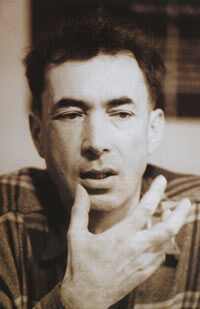 The
nervousness about appearing again was big - especially after six years
away from the stage. With a completely new group, new songs, a new Hubert
von Goisern. "We are not yet used to playing with one another, it
is not as automatic as the last tour with the Alpinkatzen -
that is clear - we must first get to know each other in this situation." He
does not speak about the time with the Alpinkatzen again.
He knows about the success, the experiences and great moments that this
brought him. He is someone who does not look wistfully to the past, but
with energy to the future. Nevertheless: the fear remains of perhaps
no longer going down well, of his style of music not being listened to
in the age of modern pop and electronic music. Up to the start of the
tour at the beginning of March.
The
nervousness about appearing again was big - especially after six years
away from the stage. With a completely new group, new songs, a new Hubert
von Goisern. "We are not yet used to playing with one another, it
is not as automatic as the last tour with the Alpinkatzen -
that is clear - we must first get to know each other in this situation." He
does not speak about the time with the Alpinkatzen again.
He knows about the success, the experiences and great moments that this
brought him. He is someone who does not look wistfully to the past, but
with energy to the future. Nevertheless: the fear remains of perhaps
no longer going down well, of his style of music not being listened to
in the age of modern pop and electronic music. Up to the start of the
tour at the beginning of March.
Hubert von Goisern and his band played in perfect harmony as if they had never done anything else and stirred up a storm of enthusiasm in the audience. They all came - fans who had stayed true over the years and many new ones too - and let themselves be carried away by the melodies that got under the skin. Despite his musical renewal and distance from earlier hits like Hiatamadl, his style seems to be exactly what the people have been waiting for: an idea to think about, values and traditions to reflect on, feelings to follow - above all age and other limits. Hubert von Goisern makes simple "folk music", newly interpreted, enriched with his own critical thoughts and lots of feeling, combined with rock and pop sounds, blues and funk rhythms - a music simply for people.
Years of travel
It all began on 17th November 1952 when he was born in Bad Goisern as Hubert Achleitner. The world in his home area is soon too small for him, he seeks out far-off shores. First of all he goes to South Africa as a chemistry laboratory technician, later Canada is the aim of his desire for discovery, where he works as a musician. During an extensive journey in Asia, he discovers his interest for native folk music by playing music with the Filipinos. "There is something I have always found no matter where I have been: different perspectives."
Back in Austria he learns to play the Styrian accordion - he can play various brass instruments and guitar since childhood - and intensively occupies himself with folksy songs and yodels. He looks for and finds his own perception of folk music: for him it is not old and venerable, but what the people make their music. And he especially stresses that every musical direction, like life, is adaptable. Then in Vienna he meets scene musician Wolfgang Staribacher, with whom he makes the first Alpinkatzen album Alpine Lawine and in whose live programme the later hit Koa Hiatamadl and the lyrical Heast es Nit is to be heard. But the hoped for breakthrough is still not successful.
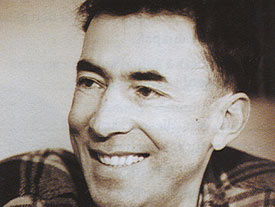 With
his newly founded 1991 band Die Original Alpinkatzen and
the Tyrolean yodeller, Sabine, Hubert von Goisern brings the CD Aufgeigen
stått Niederschiassen onto the market and sets the ball of success
rolling. First class hit parade places, sold out concert halls and enthused
reporting are the consequences. The fan community extends from the German
speaking countries, to the whole of Europe, to over the pond in the USA.
But three years later, to the astonishment of everybody, Goisern ends
the Alpinkatzen chapter at the height of
their success with the Omunduntn tour and
the live album, Wia die Zeit Vergeht. He
wants to do something different again: he composes, among other things,
the film music for Josef Vilsmaier's Schlafes Bruder,
gives his acting debut as a shady farmer in Die
Hölleisengretl, and write the screenplay for the TV film Eine
steirische Fernsehgeschichte (sic).
With
his newly founded 1991 band Die Original Alpinkatzen and
the Tyrolean yodeller, Sabine, Hubert von Goisern brings the CD Aufgeigen
stått Niederschiassen onto the market and sets the ball of success
rolling. First class hit parade places, sold out concert halls and enthused
reporting are the consequences. The fan community extends from the German
speaking countries, to the whole of Europe, to over the pond in the USA.
But three years later, to the astonishment of everybody, Goisern ends
the Alpinkatzen chapter at the height of
their success with the Omunduntn tour and
the live album, Wia die Zeit Vergeht. He
wants to do something different again: he composes, among other things,
the film music for Josef Vilsmaier's Schlafes Bruder,
gives his acting debut as a shady farmer in Die
Hölleisengretl, and write the screenplay for the TV film Eine
steirische Fernsehgeschichte (sic).
In 1996, he travels to Tibet and to the east African Tanganyika lake, confronted in one place by brutal violation of human rights, and in the other with fascinating discoveries of behavioural research on chimpanzees, meets the Dalai Lama, who deeply impressed him, and Jane Goodall, with whom he is still united today in a deep friendship. That music arises from all these impressions is a certainty with Hubert von Goisern. The results of his encounters with the foreign cultures are called Inexil, recorded with Tibetan musicians, and Gombe - both thought of as an initiative "not to ignore what happens elsewhere."
Summit stormer
After about six years away from the stage and a time with little music, he returns at the end of 2000 with the album Fön which he immediately follows with Trad, as if the ideas had already piled up and wanted to come out of him. That he can start up without thinking of the success of earlier years, that his music has lost nothing of its power and capacity for enthusiasm, is also proved by the award of the gold disc for Fön in Salzburg at the beginning of this year.
Hard to believe, that someone like him roundabout ten years ago would have been given no chance, that only a few believed in him. It is only thanks to his obstinacy and the belief in his style of music, that we have him and his songs. Through him concepts like naturalness, tradition and homeland receive a new meaning. "There is nowhere more beautiful than home" one often says first of all, if one has been away, everything once viewed from the outside. Thank God he is back again now.
How do your lyrics arise, do you sing from experience?
I can only write what I have lived through, stories that have happened. It is all worth singing. At the beginning is an idea that then comes to a song.
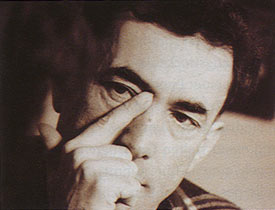
Which song from the album, Fön, could be a hit?
I don't think any, most likely Katholisch, but that could be too extreme that it perhaps doesn't go down well with some people.
The album Trad is again quite different from Fön
Yes, there are only pure folk songs, no original compositions of my own on it. I wanted to do it a few years ago, but my courage failed me. There was the fear that the people could think that I could not think of anything new any more.
Do you have a personal favourite from these two CDs?
It is difficult to say. Songs are like children, you like them all the same.
Are there already plans for the time after the tour?
None fixed - perhaps to make a film or write a book, but a novel or a story, something fictional where you can let the fantasy play.
Do you feel that you and your music are different?
Different in so far as I differ from others through my success and what I do, however I am basically the same as everyone. The success changes some, people approach me differently. But I do not have the feeling of having more talent.
What music do you like to listen to?
Almost anything. I do not tie myself down so much. There is good quality music in every area. Only the offering is so big that I often don't find the good things any more.
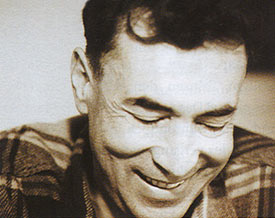 What
is your motto for life?
What
is your motto for life?
I believe that if you do not do what you believe in, then - seen in the long term - you will not be happy. For that reason, you naturally need a certain readiness to take risks, but it pays off.
How do you characterise yourself?
At best, not at all. I see my strength as knowing how to deal with stressful situations. Where others throw in the towel, I keep my nerve and simply carry on.
Which message do you send with your children on their way?
It is difficult to have a father like me, since I do not like to profess a basic principle. They should find their own way, with all the good and disagreeable situations that could arise.
Which characteristic do you value in others?
Character - in the broadest sense of the word. If someone stands by what he can do and what he is, and does not try to be someone else. Straightness also goes with that for me.
What does happiness mean for you?
At the moment, despite the pressure I lay on myself, happiness means that it is possible for me to write songs, find people who will record with me and to be supported by many. Generally, I am happy to have something like a nest, a family, where I can go back to.
Is there something that especially worries you?
Well, more the Gallic fear that the sky will fall on my head ...

Hubert von Goisern is back again - with "Fön" in his luggage
The new CD is coming at the beginning of November
and probably the most prominent representative
of "new folk music" returns to the stage in the spring.
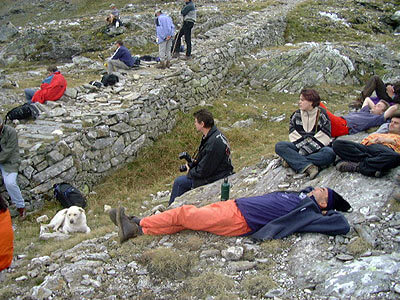
Bad Ischl (SZ) Almost exactly six years to the day after he and the Alpinkatzen said
goodbye to the stage in Münster, Hubert von Goisern returns with
a powerful sign of life - with a new band and the new CD Fön.
He was not idle in the meantime, the analysis of Tibet's music and that
of Africa (which found expression in among others, Gombe and Inexil),
some film projects (Schlafes Bruder) and
engagement with many other areas let the years go by quickly, but in
the long term, the musician in Hubert came off somewhat badly.
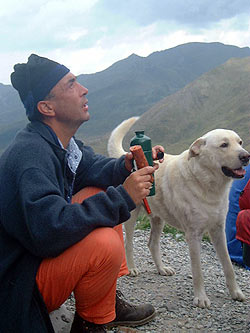 As
someone who had never kept quiet about his opinion, he also spoke about
the blue-black government and already knew at the beginning of the year
that he wanted to return to the stage. For he feels at home there, face
to face with his audience, he said to SZ, and everything else "that's
not really me".
As
someone who had never kept quiet about his opinion, he also spoke about
the blue-black government and already knew at the beginning of the year
that he wanted to return to the stage. For he feels at home there, face
to face with his audience, he said to SZ, and everything else "that's
not really me".
And so it is also not a coincidence that one of the numbers on the CD is called Kålt and relates very deliberately to the current political situation in Austria.
The lyrics of the new (with an exception - Mercedes Benz) songs are all in dialect by the way, "because it simply fits better." Certainly nobody should believe that a Hubert von Goisern today will start exactly where he stopped six years ago.
"You must first make a cut, in order to then after a time, be able to have a look at "where you stood at that time and where you stand now", he says looking forward to his comeback, the essential part being to contribute to blowing away the stale air of folk music and to sharpen the contours, as it given to Fön - even if he/it causes a headache now and again.
The fresh breeze that comes from the CD will also blow from the stage next stage - and the Salzkammergut is also included in the plans: Hubert and his new band will probably appear at the Kongress & Theaterhaus in Bad Ischl in March.
